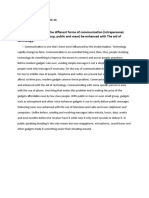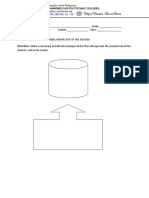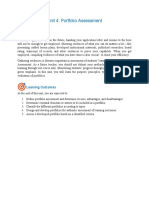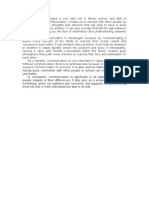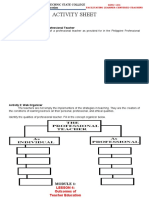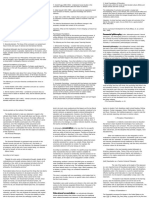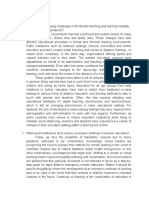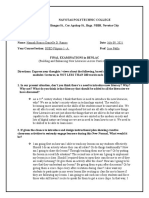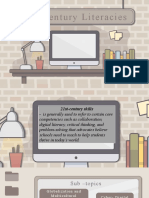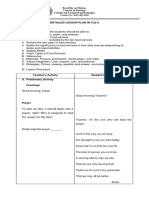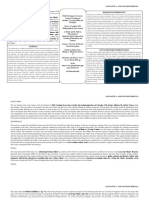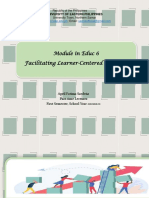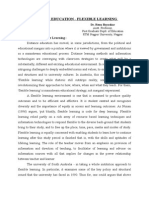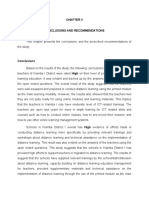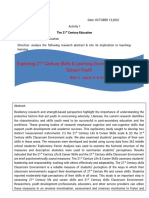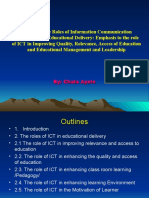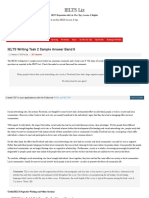1
Nerjone D. Alvero (TLE 312 - Prof. Jp E. Fortinez) 14 February 2022.
Reflection Paper
The current educational system is now more focused on online learning since the COVID19
pandemic still threatens the well-being of children who usually go to school and learn face to
face with their respected teachers. The old educational system was so teacher dependent that
students must need to pay attention to the teacher for them to learn efficiently but when the 21st-
century approach so does the information era begins where technological advances can literally
be seen everywhere and where old learning can be considered boring and inefficient that’s why
ICT appeared which Anderson, J. (2010), illustrates ICT. The term ICT, short for Information
and Communication Technologies embraces the many technologies that enable us to receive
information and communicate or exchange information with others (p. 13). Through these
technological advances, teaching and learning can be more effective and efficient since
information can be transmitted through almost everything from phones, laptops, computers, etc.
with the internet almost every piece of information and data can be easily acquired. ICT helps
students to become computer literate and learn more efficiently according to UNESCO (2011)
ICT can provide students with access to educational resources (p. 23, par. 4) which means that
learning is becoming much more efficient compared to the old educational system. That’s why
ICT needs to be enhanced especially online learning revolves around technology so much that it
needs to be promoted and become one of the priorities to strengthen the current education system
since finding a competent qualified teacher on ICT is still scarce. The author’s quote, “it is not
� 2
enough to install technology into classrooms – it must be integrated into learning”. “Nothing can
substitute for a good teacher” (Tan, 2015, s. 6). Yes, nothing can change a good teacher but a
teacher can change the way of teaching by taking advantage of the current technology by using
its full potential for the learners to have more insights and make learning more efficient.
Furthermore, according to UNESCO (2011), many governments are using the introduction of
ICT as a way of providing teachers with new skills and introducing new pedagogy into the
classroom (p. 23, par. 3). In which 21st-century teaching was slowly adapted and being taught to
schools, colleges & universities around the world to prepare for the new generation while slowly
integrating ICT into education. In which ICT policies are slowly being implemented so that we
can further enhance and promote the use of technology in learning at the same time to avoid the
use of technology being abused and taken advantage of. Presently, we are still facing a global
pandemic that closed down schools but it doesn’t mean learning stops there since with the help
of technology online learning was implemented. WBO (n.d) stated that Technology played and
continues to play an essential role to deliver education to the students outside of school.
Commendably, all countries were able to deploy remote learning technologies using a
combination of TV, Radio, Online, and Mobile Platforms (par. 4). With the difficulty in
learning, we really need a good teacher to continue to inspire and guide us but what does it take
to become a good teacher? There are so many factors to be considered which is why competency
standards for ICT teachers are made, UNESCO (2008) presented ICT COMPETENCY
STANDARDS FOR TEACHERS and UNESCO concluded that, by using the policy framework
presented, a ministry can assess its current educational policies, in the context of its current and
future economic and social development goals. It can select the appropriate approach for
connecting ICT to other education reform efforts. With the policy framework made by UNESCO
� 3
as a base, we can further develop the current educational, economical, etc. systems. To point out
understanding ICT and its policies in education in this era can really help a teacher a lot since it
contains knowledge and information that is needed as well as the technical skill needed at the
same time, we can explore the diverse world of technology and inspire us to innovate and
improve in learning to be a successful teacher in the future. I believe that change starts within
oneself but learning is the very first step to move forward to the future.
� 4
Reference
UNESCO (2008). ICT competency standards for teachers: Policy Framework. United Nations
Educational, Scientific and Cultural Organization. Retrieved
from https://unesdoc.unesco.org/ark:/48223/pf0000156210
United Nations Educational Scientific and Cultural Organization. (2011). Transforming
Education the Power of ICT Policies. UNESCO. Retrieved
from http://www.unesco.org/new/fileadmin/MULTIMEDIA/FIELD/Dakar/pdf/
Transforming%20Education%20the%20Power%20of%20ICT%20Policies.pdf
The World Bank. (n.d.) Digital Technologies in Education from
https://www.worldbank.org/en/topic/edutech#1
Anderson, J. (2010). ICT transforming education: a regional guide. UNESCO, Bangkok Asia and
the Pacific Regional Bureau of Education. Retrieved
from https://unesdoc.unesco.org/ark:/48223/pf0000189216
Tan, M. (2015). ICT Competencies Needed for the 21st Century. retrieved
from https://www.britishcouncil.ph/sites/default/files/melizza_tan_ict_competencies_ne
eded_for_21st_century.pdf





